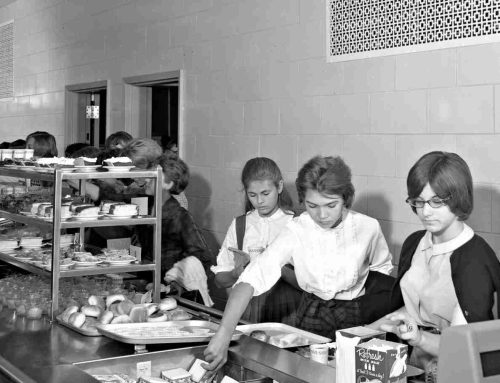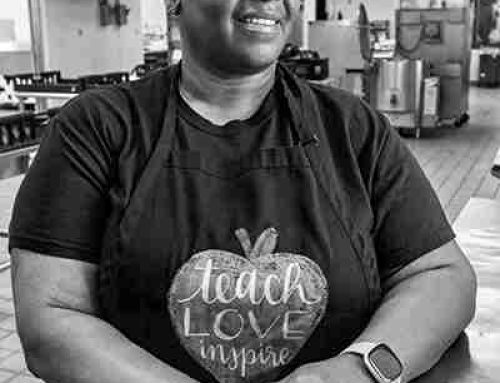Listen to the interview with Shelia and Aaron Henkin from WYPR.
Name: Shelia Alston
Job title: Food & Nutrition Operations Manager, retired
Photograph location: Baltimore Museum of Industry
Years of service: 34
We are part of the learning process with the kids, because a child cannot learn if they’re hungry. So we give them the nourishment they need in order for them to function and their brain to function. When students would come in, and they basically would come, and they didn’t like a particular food item or the choices that we had for that day. I would talk to them. And I had one particular one. I would say, “Well, try this, because I really like it, and I didn’t really know this item even existed.” And they would try it, and then once the young lady tried it, she came back and hugged me and said, “Oh, that was really good.” And it really made me feel good to know that I did something to help someone. – Shelia Alston
Shelia Alston_BMI_08-25-21
Transcript of Shelia Alston’s interview with Aaron Henkin by Rev.com
Shelia Alston:
My name is Shelia Alston. I am a retired food service employee with Baltimore City. I was with the organization for 35 years. I have worked several schools. I have been a regional cafeteria manager, a training supervisor, and also a manager.
Aaron Henkin:
Rewind to the very beginning of your career. Talk about who you were in your life at that point and how you ended up in a school cafeteria.
Shelia Alston:
Well, I was young, just married. I was in my early 20s. I had three children, and I applied for several positions. I applied for food service worker and also with Baltimore City Jail. Both positions came through at the same time, but I decided to take the food service position, as a substitute food service worker. And reason for that was because of my children. I felt that I would be able to be home with them more often if I worked for food service. And at that time, it wasn’t about the money, because the correctional officer paid more money, of course.
Shelia Alston:
So that’s how I wind up with Baltimore City Public Schools. And I wasn’t really into cooking, as far as enjoying it. But once I worked for food service and gotten into the kitchen and dealing with the students, I find that I loved it.
Aaron Henkin:
What do you remember about that, that first day on the job, that first week on the job, maybe the first month? The things that surprised you about what went into this work and the things that were part of what you needed to learn how to do.
Shelia Alston:
What surprised me was everything was menu items, recipes. You had details to follow. There were guidelines that you had to follow. It wasn’t just a matter of preparing food. It was nutritional food for the students, and it was a lot of hard work that I don’t think I, or anyone else, when they first get into it, understands. But it takes a lot of dedication and hard work to get the job done. And you also had a limited amount of time to prepare food, so you could be ready for the students.
Aaron Henkin:
You say you had a 35-year career?
Shelia Alston:
Yeah.
Aaron Henkin:
Yes. 35 years. Talk about how food and nutrition changed, how the menus changed over the years. You’ve seen a big chapter of school cafeteria history.
Shelia Alston:
Yes. Well, the food changed, because in the beginning, there was a lot of prepping to the food. You basically started from scratch. When we had chicken, you had to clean the chicken, cut the chicken, prepare the chicken. Now, chicken is already pre-cooked. Everything was homemade, but you had the staff in order to prepare these items, where with the cost of living and the prices of everything going up, then we didn’t have enough staff to prepare food. So they basically went to prepared food, in most cases.
Aaron Henkin:
Talk about the kind of food that kids love to eat and the kind of food that maybe is a little bit more of a challenge to introduce them to. And maybe … Look, kids are picky eaters. They also maybe grow up in families where they, I don’t know, maybe don’t have that wide of a menu of options on the family table. And the cafeteria is kind of a learning experience for them, too, isn’t it?
Shelia Alston:
Yes, it’s a learning experience. And basically, one item I know kids love is corn. I don’t know why, but they love corn. They also love pizza. It seemed like all kids are into pizza. Some of the collard greens, salads, and things like that, most kids didn’t like. There were kids that liked it, and they were-
Aaron Henkin:
Stand by. Just a second. You were mentioning the collard greens.
Shelia Alston:
Right. The collard greens were some items that kids didn’t like, and also salads. But well, most kids weren’t introduced to these food items, but the ones that were, they selected it. And it was good that students had a matter of choices, because it saved on waste of food when they had choices. And they had a limited amount of items they must take, in order for it to be a reimbursable meal, through the federal and state government.
Shelia Alston:
But I think the kids in generally loved lunch time, because it was a time to socialize. And in the classroom, you can’t really socialize, so it gave them a time to talk to the other classmates and enjoy the food while they were doing it.
Aaron Henkin:
I wonder if you have a story you might share, about a particular student that you developed a bond with, or maybe whose story just reminded you how important the work was that you were doing.
Shelia Alston:
Well, when students would come in, and they basically would come, and they didn’t like a particular food item or the choices that we had for that day. I would talk to them. And I had one particular one. I would say, “Well, try this, because I really like it, and I didn’t really know this item even existed.” And they would try it, and then once the young lady tried it, she came back and hugged me and said, “Oh, that was really good.” And it really made me feel good to know that I did something to help someone.
Aaron Henkin:
Talk to me about … When did you retire?
Shelia Alston:
I retired twice. I retired once in 2013, and I came back in 2014, and then I officially retired in 2018.
Aaron Henkin:
Like a professional athlete. Can’t stay out of it. Can’t stay in retirement, right? Let me just ask you to talk about … I’ll put it this way. There’s a lot of attention paid to teachers and how important teachers’ roles are in students’ lives. And it seems like your role is equally important, although you’re a little bit more kind of invisible. You’re not like the … What do you want people to understand about the importance of what food nutrition workers do? And what are maybe some misunderstandings that people have about what you do?
Shelia Alston:
Well, basically, with food and nutrition, basically, we are part of the learning process with the kids, because a child cannot learn if they’re hungry. So we give them the nourishment they need in order for them to function and their brain to function. And the misunderstanding, I think, that some people get with the Food and Nutrition Service Department, is that the food that we prepare are nutritional for the students, where it’s not the same as prepaying food at home, where you add all these other ingredients and all to the food. And I think they misunderstand that.
Shelia Alston:
Our whole thing is … And it’s in the word nutrition, and it’s for the health of the kids, as well. So I think that’s a lot that people really don’t understand, because they want the food in the schools to taste the same way they do at home, and where they put excessive fats and all in the food. And they totally … I think that’s misunderstood about us.
Aaron Henkin:
How do you think your career changed you or helped you grow as a person? 35 years in that field. I mean, you could have spent that 35 years working at the correctional facility. It seems like a long career will kind of give you a certain perspective on life. I wonder how your career has shaped who you are and your outlook on life.
Shelia Alston:
My career has basically, in food service, have made me understand the need of our students, as far as food. The poverty that’s going on, it has made me become the type of person that really enjoys being around students, being involved with them. It has given me a chance to teach other food service employees, and I really hold high on doing things the right way, and I enjoy showing people the right way to do things, and I feel a pride in it. Where people always do not understand, I try to explain, because I find that when you explain why you are doing something, people better understand you. So I take pride in that.
Shelia Alston:
I just love being in food service, and I seen, at one point, where I could move up the ladder, and I took that. I started off at food service. I had a GED. While working there, I obtained a Associates Degree for Dietetic Technician. I also received a Bachelor’s in Business Management, while working in Food and Nutrition Services. So it really has expand me, my mind, and all.
Aaron Henkin:
Last question for you. When you look back on your career, what was the part of the job that … What was your least favorite part of the job, the part of the job that gave you the biggest headache? And what was your most favorite part of the job, the part of the job that made it all worthwhile?
Shelia Alston:
My least part of the job was managing people. It was something that had to be done, and where you sometimes look to be the bad guy. So that was the least. And then when you have to deal with all kinds of issues with employees, that was something that was the least, but it had to be done. The most thing I loved about it was basically feeding the kids. I just love being around them, and I’ve worked elementary, middle, high school, and I was able to get along with them in each school setting. So I love seeing the kids and talking to them.
Aaron Henkin:
Anything else you want to add before I let you get on with your day, that I neglected to ask you about?
Shelia Alston:
I can’t think of anything, but I’d just say that working in food service has really grown me into a person that really appreciates the job that the Food and Nutrition Service Department does, even though, like you said, they always left behind. They always forgotten, but they are a big part of the teaching process.



